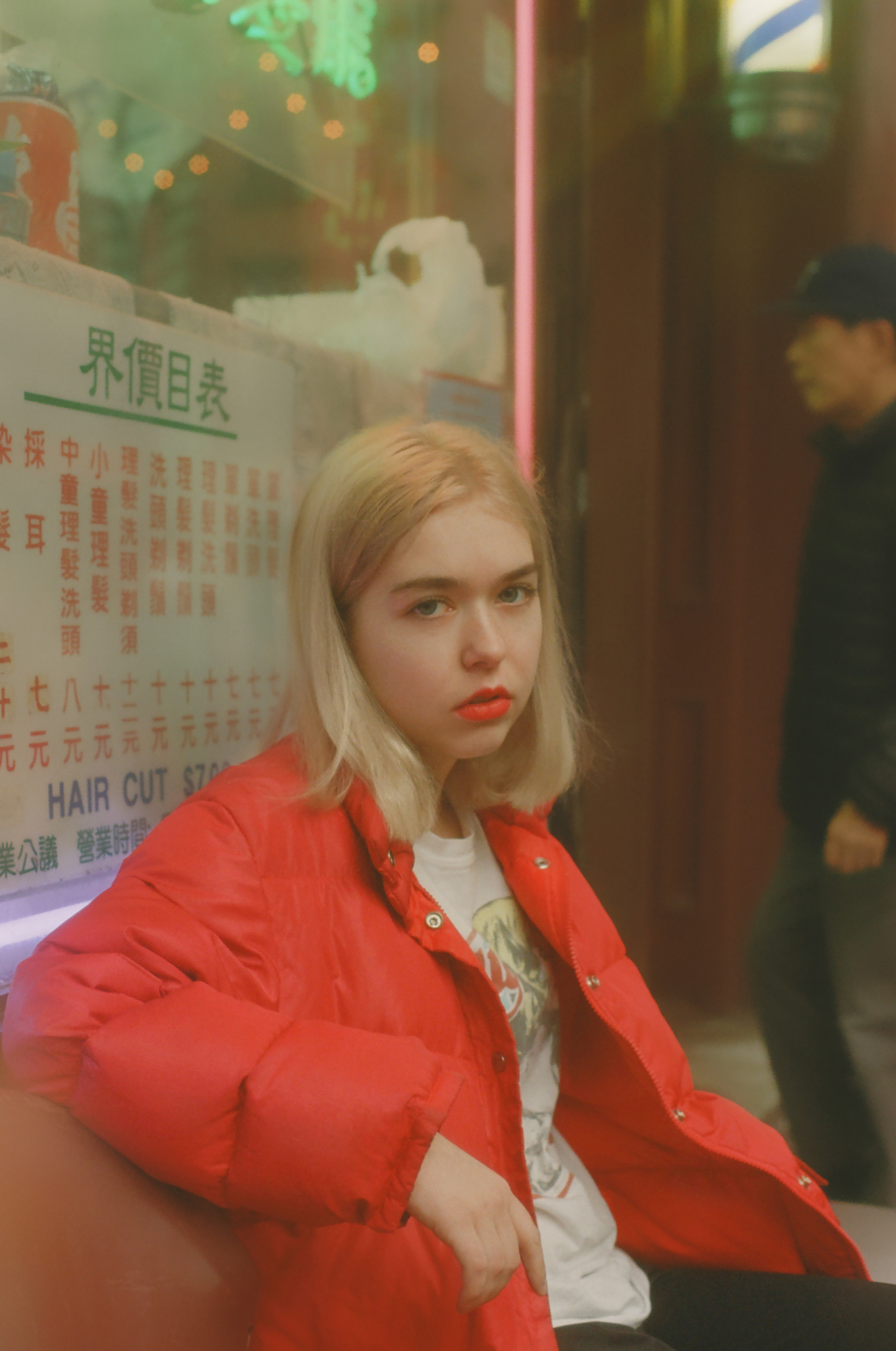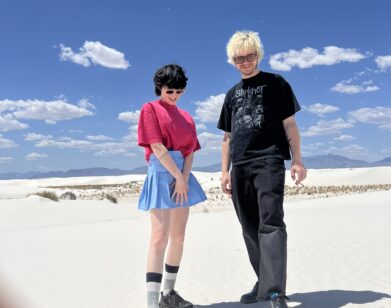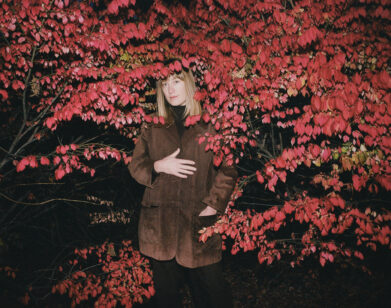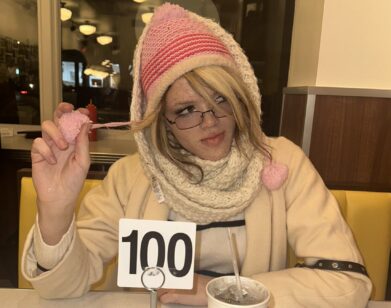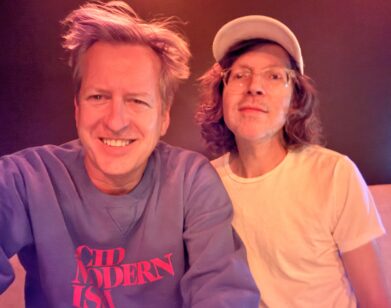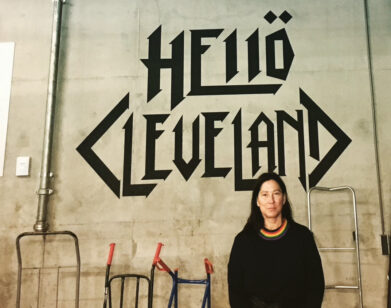Teenage indie rock sensation Snail Mail doesn’t need your labels
Lindsey Jordan has had a momentous couple of years. After the release of her debut record, Habit, in 2016 under the name Snail Mail, the Maryland-native has toured the world, played countless festivals and even managed to graduate high school. Between all of this, she also recorded a new album, out later this year. A catchy teenage manifesto, the album shows Jordan at her most vulnerable, 18 years old and on the road. In line with a rising tide of young indie rockers like Girlpool and Soccer Mommy, the singer and guitarist mixes heavy rock riffs with a lo-fi earnestness that captures the often confusing yet powerful nature of being a teenage girl. While growing up isn’t pretty for most of us, we’re usually spared from having to share it with the world. Not Jordan, whose songs trace her evolution from a bright-eyed crush-driven adolescent to a wiser, occasionally jaded young woman. “It’s a super honest reflection of my experience,” she says about the record. “I just worked a lot on making something that was as genuine as possible, and that I feel like I could personally listen to and play every night without wanting to vomit.”
With her new album out this summer, Interview sat down with Snail Mail to talk growing up on tour and being an openly gay woman in indie rock.
ALEXANDRA WEISS: Tell me about your upcoming record. How would you describe it?
LINDSEY JORDAN: I definitely think it’s more mature, it’s more guitar-oriented. I spent a ton of time in between the last record and this, just locked in my room, absorbing as much music as possible and trying to figure out what I think it takes for a song to stick with me—what it is about a record that makes me keep coming back to it over the years.
WEISS: So, what does make a song stick with you?
JORDAN: Just a sense of style in a guitar player I think is really rare. All my favorite guitar players—like Kurt Vile, Steve Gunn, Marnie Stern, Mary Timony of course, Mark Kozelek. I was just talking to a friend about him and Sun Kil Moon and Red House Painters. It’s like, you don’t even have to ask someone—you can tell right away when you listen to someone’s music if they’ve been influenced by him. It just rubs off on people. That’s what I look for in a guitar player. That, and originality.
WEISS: You said the record was more mature. In what way?
JORDAN: It’s just a super honest description of everything I’ve gone through. And it’s definitely more honest in that I’ve come to terms with a lot of things about myself. I’m openly gay at this point, and I don’t think it really comes into play with how we identity as a band. But it definitely does with how I identify as a person, and I didn’t really hold back at all on this record, expressing how that’s has changed my life. I mean, when I wrote Habit, I was definitely not expressing anything—I was really shy. Now, I feel like I’m much more of a real person in every way.
WEISS: Well, you were 15 when you wrote Habit.
JORDAN: Yeah, I’ve definitely gone through a lot since then. Even just the whole Snail Mail process—it’s really shaped me as a person. Being in a band, there’s a lot of weird shit you have to go through—lot of hoops you have to jump through. I mean, I can’t speak for everyone in music, but you learn a lot about what really matters. And at the end of the day, it’s kind of like I’m two people. There’s the person that’s alone with a guitar writing in my room, and the person that’s on stage faced with all of these hard decisions, meeting people, and being in a new city every night. It’s kind of like, you have to be this weird, icy business person at times, and that’s really just not who I am. I feel like a jaded old man sometimes.
WEISS: How do you think you’ve grown as a songwriter since you started?
JORDAN: Habit, for me, I wrote it almost hastily, and I honestly didn’t think anyone would really hear it. I wrote the songs about things that were so personal that I actually almost hoped nobody would. I was like, ‘Uh oh, this girl is going to know it’s about her. This is deep, top secret.’
WEISS: This is almost the first album you’ve written to actually be heard.
JORDAN: Yeah, this record is very thought out, very stylized. It’s very planned, everything is for a reason and every lyric means something. I could probably give you a detailed explanation of every single word, space and breath on the record—it was written and rewritten so many times. And we spent so much time in the studio dissecting everything that it became completely deliberate. It’s just, every part of this record is meant to be there and that was such an emotional process. Collaborating with people and putting all of your ideas out there into this cohesive space, is so weird and emotional and different than what I was used to. It was an amazing experience, but thinking about doing it again already makes me want to throw up.
WEISS: Lyrically, were there any big themes you wanted to explore on the album?
JORDAN: I was writing it over two years, so everything was really different at the beginning of the writing process than it was at the end. But a lot of the songs are about relationships, crushes. Actually it’s funny, we didn’t have titles for any of the songs until it was mastered. So, we were literally writing people’s names on the setlist. That’s what really inspired me to write—my direct experiences with people. I was just being super melodramatic and almost complaining to a diary. But towards the end of the record, I wasn’t so interested in writing about girls or relationships anymore—I was just writing about myself because I didn’t feel so affected by my relationship dramas. I just feel like, I’d been through so much and know so much more about the world now, that I know so much more about what’s important.
WEISS: I know you’ve been playing guitar since you were really young. Did you always know you wanted to be in a band?
JORDAN: Yeah, but I didn’t want to be the front person.
WEISS: Why?
JORDAN: When I was young and playing guitar, I just didn’t even know that girls were allowed in bands. I was always interested in those Warped Tour, Hot Topic bands, and there definitely weren’t women on The Warped Tour. So, I didn’t have any inspirations that were women—I didn’t have anyone I could look to and think, ‘Oh maybe I could do that.’ It actually really distressed and disturbed me. I wanted to be friends with boys and I wanted to play in their bands, but I was like, ‘I don’t even know if I’m allowed.’ Then my sister took me to a Paramore show when I was 8, and that just blew my mind. I remember being just completely overjoyed, like, ‘I want to play guitar in a band!’
WEISS: So, when did you decide you wanted to be a frontwoman?
JORDAN: I mean, I figured out that I liked singing, but I was terrible at it for forever. Then I sort of started to develop a taste for it. I remember just realizing, ‘I’m a really loud, talkative person. Maybe I do actually want to have that shining light down on me.’
WEISS: There are so many more women in bands now, it’s not like it was when you were younger, and you didn’t have any female role models. Why do you think that is?
JORDAN: Because representation matters, and there’s finally been an evolving number of bands with women that have inspired people. It’s really cool to be able to see it actually happening, like, ‘Oh cool, I can do that,’ because as a kid, if you don’t see it right in front of you and you don’t happen to have a cool older sister or some cool older friends, you just don’t even know it exists.
WEISS: But even in rock and punk rock, and other the spaces that women do have more representation, it’s still treated like such a novelty. You’ll never read an article about a band that has a girl in it without seeing the words “girl band.”
JORDAN: Yeah, being a girl is not a genre. And for me, it’s like three pillars: gay, young, female. We get pigeonholed a lot, and people really want us to have a message. But we don’t really have one. I mean, we’re all really politically driven people. We all grew up in the punk world and we’re all from the greater D.C. area. So, we all came up in the punk scene, and we all have politics that we stand for. Everybody in the band is very passionate. But nobody is expressing it in our music. It’s frustrating, because it’s almost like you can’t be a woman and not have a stance. Personally, I have one.
WEISS: But Snail Mail doesn’t.
JORDAN: Right. But I mean, I think it would be fucked up if you were doing this and not a feminist. Because when it comes down to it, it’s not like you can just do this and not experience sexism. So I’m obviously a feminist, but I’m definitely not writing feminist rock or anything. I just get labeled so much, I try to take it in stride. I was talking to someone the other day about how being an openly queer person, that sort of brings along people who look up to you for that reason, people who are like, ‘Oh yeah, I’m gay too.’ That’s what makes all the pigeonholing almost okay—because it’s cool to know that you can be that representation for somebody, that someone might feel a little more comfortable at a show or more driven to start a band.
WEISS: What do you want people to take away from your music?
JORDAN: I would love people to just listen and not be so obsessed with the fact that I’m a girl, or that I’m gay, or 18. I’d just love for them to like the music, and hear all of the influences, and feel inspired—and not because I’m a woman. I’m not looking for any handouts, but a lot goes into making a record. You really have to, at least in my opinion, make yourself vulnerable, or else you’re not making honest music. I know I have no interest in just pumping out records. I want to make music that means something to people, and that I like.
SNAIL MAIL’S NEW RECORD WILL BE OUT LATER THIS YEAR ON MATADOR RECORDS.

